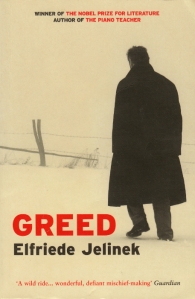 I tried to read Elfriede Jelinek’s The Piano Teacher a few years ago but found it to be written in a cold, unforgiving style that I wasn’t in the mood for at the time. I had considered trying it again for ‘GLM IV’ but saw a copy of Greed in my local library and thought I’d give that a go instead.
I tried to read Elfriede Jelinek’s The Piano Teacher a few years ago but found it to be written in a cold, unforgiving style that I wasn’t in the mood for at the time. I had considered trying it again for ‘GLM IV’ but saw a copy of Greed in my local library and thought I’d give that a go instead.
 Greed centres around a country policeman, Kurt Janisch and the various women with whom he’s having affairs with. The story as such is simple and the main details are disclosed early in the novel. Kurt Janisch has a permanent erection and he targets women with property with the aim of relieving them of their houses. He’s not opposed to having sex with the women’s daughters as well if the situation arises. Kurt is married and has a grown-up son, Ernst, who is also married. Ernst lives in his wife’s elderly mother’s house where they’re waiting for her to die so they can inherit the property. Kurt’s and Ernst’s approach is described in the following quotes:
Greed centres around a country policeman, Kurt Janisch and the various women with whom he’s having affairs with. The story as such is simple and the main details are disclosed early in the novel. Kurt Janisch has a permanent erection and he targets women with property with the aim of relieving them of their houses. He’s not opposed to having sex with the women’s daughters as well if the situation arises. Kurt is married and has a grown-up son, Ernst, who is also married. Ernst lives in his wife’s elderly mother’s house where they’re waiting for her to die so they can inherit the property. Kurt’s and Ernst’s approach is described in the following quotes:
They pay court to women. Both of them actually. But mainly Janisch senior, the country policeman. That’s so easily said, but he has already made so many people in this town and in this part of the country unhappy. Well, would you have guessed it? Preferably women who own houses or apartments in the nearby small town.
It’s a good thing if one gets around in one’s job and the hours are a bit flexible, so that one can go for a wee drive in between. The husbands of these wives should be deceased if possible or never have existed in the first place. There should never have been children present either.
He does have dreams, the man, they are, however, nailed to one or more houses or owner-occupied apartments and so not at all times freely disposable. Well, one house, a little house, he already has, his wife brought it into the marriage, that’s also why he keeps the wife who belongs to it, despite the cost.
There are further discussions of Kurt’s methods together with his casual liking of sex and violence. There are some vague descriptions of a woman’s body found in the lake and descriptions of a man wrapping it in a tarpaulin and dumping it in the lake. Although it’s difficult to pinpoint at what point in the novel it becomes clear that Kurt is the murderer, it is quite early on. Despite the blurb on the back of the book this is not a murder mystery; the disclosure of the killer does not affect the reading of the book. Kurt is portrayed right from the beginning of the novel as a totally amoral character so he’s the first person you suspect.
This is quite a challenging book to read and it’s the author’s style that I feel would put most readers off finishing it – it almost made me abandon it. It’s told in the third person, but it’s unclear exactly who the narrator is, or if it is the same narrator throughout the book. Everything is clouded in mystery and many sentences are quite cryptic, we get the narrator’s views on a variety of subjects, some relevant to the novel, whilst some are not. At times the narrative style reminded me of Louis-Ferdinand Céline, in that the narrator struggles to tell the story coherently as they get distracted by other thoughts, then circle around several times only slowly revealing the main narrative that we, the reader, is eager to hear. Céline does it brilliantly, but I’m not sure about Jelinek.
The other thing that might put off potential readers is that the characters are repellent, Kurt especially, as he’s portrayed as this greedy, amoral monster who is only interested in fucking and killing. For example it is revealed that through his job he gets access to pictures of car-crash victims and masturbates over them. The female characters aren’t much better; they’re vacant and just passively accept their fates and they’re all besotted with Kurt, or men similar to Kurt.
Women don’t know how dangerous he really is, and if they did know, they would only steer all the more impetuously towards his powerful, somewhat thickset body cliffs, throw themselves forward, until their little boat breaks against a resistance they haven’t seen, because it was buried down below under the women’s foam.
Basically everything can be done with women, it’s as if they had done something wrong and wanted to be punished. And whatever has never been done with them, that’s what they want to do more than anything else.
So, I’m not really sure if I like this novel or not. Although it was relatively easy to read, it was difficult to comprehend and for large parts of it I was just wondering just what the point was in reading it. However, it’s been a few days since I finished it and it has started to ‘settle down’ and maybe it’s one of those books that seem to improve after it’s finished and after a second reading…maybe.
Greed by Elfriede Jelinek was translated by Martin Chalmers and published by Serpent’s Tail.


Wonderful review, Jonathan. Sorry to know that you didn’t like the book as much as you had hoped. I think it is hard to like the book, if most of the characters are repellent. It was interesting to read your thoughts on Jelinek’s style and your comparison of that with Louis-Ferdinand Céline’s. I haven’t heard of Louis-Ferdinand Céline. I will add him to my list of authors to be explored. Thanks for mentioning him.
Hope you like your next book more. Happy reading!
LikeLike
Céline is one of my favourite authors so I often end up comparing other authors to him. I’m glad I read ‘Greed’ though, it just wasn’t quite what I was expecting.
I’m now reading ‘Indian Summer’ which is completely the opposite to ‘Greed’.
LikeLike
Excellent review and I confess I don’t think I’ll be reading this one. I know we don’t want our characters to be sappy and one-dimensional, but there are some that you can just find no redeeming features for, and the woman-hating here would really put me off.
LikeLike
It’s certainly a bit of an acquired taste. It’s not a book for the summer holidays. 🙂 No-one comes out of it looking good – everyone is portrayed as a monster.
LikeLike
I find I need to be in the right mood to read Jelinek (usually indignant about some feminist or political issue), so I can completely understand your initial distaste. I think that’s precisely the effect she intends.
LikeLike
It did seem to improve as well but that may be that I was just getting used to it. As I was going through the book to write the review I was starting to appreciate it more. I think I will try The Piano Teacher again somewhen.
LikeLike
I think Jelinek goes out of her way to be confronting, in the way that Germaine Greer was sometimes ostentatiously rebellious against norms, but without Greer’s sense of humour. Still, I remember reading the Piano Teacher and thinking to myself, would this character be as repellent if portrayed in the same way but the opposite gender? It made me think about why that was so…
LikeLike
I think now that I’ve read Greed and its effect has sunk in a bit I’d like to try The Piano Teacher again. Maybe it is easier to read novels with repellent male characters as we’re probably more used to the baddies being male. In Greed though, everyone is repellent. 🙂
LikeLike
Forewarned is forearmed…. I have to be in the mood for repellent.
LikeLike